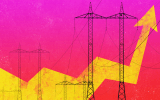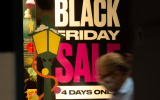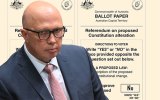
The Australian Electoral Commission has described Peter Dutton’s complaint over referendum voting processes as “factually incorrect” in a strongly worded statement defencing its processes.
This week the Opposition Leader complained that a tick on a Voice referendum ballot paper counting as a vote and cross not counting at all would advantage the Yes camp.
“There has been intense commentary online and in mainstream media regarding what will and will not be a formal vote for the 2023 referendum; specifically around whether or not a ‘tick’ or a ‘cross’ will be able to be counted,” the AEC said in a statement Friday.
“The AEC completely and utterly rejects the suggestions by some that by transparently following the established, public and known legislative requirements we are undermining the impartiality and fairness of the referendum,” it said.
“As has been the case at every electoral event, the AEC remains totally focused on electoral integrity.”
The AEC encouraged voters at the upcoming Indigenous Voice referendum to clearly write ‘yes’ or ‘no’ on their ballot papers.
But maintained that while a tick will be considered a valid ‘yes’ vote, a cross will be considered an invalid vote and not counted.
The commission said legal advice which had been accepted for three decades and over six referendum questions held that a cross on a ballot paper was open to interpretation as to whether it denoted approval or disapproval.
“Many people use it daily to indicate approval in checkboxes on forms,” the commission said.
“The legal advice provides that for a single referendum question, a clear ‘tick’ should be counted as formal and a ‘cross’ should not.”
The Referendum (Machinery Provisions) Act 1984 includes “savings provisions” – the ability to count a vote where the instructions have not been followed but the voter’s intention is clear.
Electoral Commissioner Tom Rogers said a clear ‘yes’ or ‘no’ should be written on the ballot paper and it was expected more than 99 per cent of voters would do so.
In the 1999 referendum just 0.86 per cent of votes were informal.
Opposition Leader Peter Dutton said a cross on a ballot paper should count as a valid ‘no’ vote.
“Australians want to see a free vote, fair vote, in a democratic society. It doesn’t matter whether you’re a ‘yes’ or a ‘no’, the question is whether or not it’s a fair process,” he told Nine’s Today program.
It’s emerged that Mr Dutton himself used an ‘x’ multiple times on his 2022 federal election candidate qualification form to denote ‘yes’, ‘no’ and ‘not applicable’ responses.
Labor national president Wayne Swan said the criticism was an attempt to cast a shadow over the work of the electoral commission and the referendum result.
“This is just the ‘no’ case out there using the electoral system to try to discredit the voice and in doing so, doing what many other right-wing parties around the world are doing, discrediting basic electoral arrangements,” Mr Swan said.
“It is appalling, I’m disgusted by their behaviour.”
Prime Minister Anthony Albanese will announce the date for the referendum on Wednesday, with October 14 widely expected to be confirmed.
The poll will determine whether an Indigenous voice will be enshrined in the constitution to recognise Aboriginal and Torres Strait Islanders as the first people of Australia.
Indigenous Australians Minister Linda Burney said the commission should be applauded for its efforts.
“The AEC should be congratulated for having more Aboriginal people on the (electoral) roll than ever before in our history and working closely and collaboratively with people that want to see this as a fair and equitable referendum,” she said.
– with AAP










